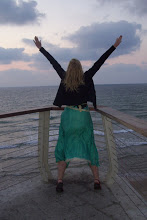It's the last Sunday before school starts, and scanning through prereleased syllabi is already making me overwhelmed. The first few days of school always scare me to death; I hear all the deadlines, test dates, rules, and consequences all at once and forget that I can do this, that I've done this, that I know how. And with grad school applications opening soon, this semester may not even technically count on my transcript.
If I'm completely honest, I want admission to graduate school more than I want anything else in the world.
I need to graduate, to get out and move on, but to be honest, though, I fail to see myself even getting into a decent program. My transcript is all over the place: years--years!--of molecular biology, Ancient Near Eastern Studies, Arabic, Hebrew, Korean, chemistry, microbiology, linguistics--! The only thing consistent is my GPA. And what does such a perfectionistic number say about me? That I can do everything but can't commit to anything? Am I really qualified to do anything at all?
I am so scared to apply. I am scared that they will see potential in me, but not direction. And I am scared that they might be right. It calls to mind the fig tree, the haunting image from Sylvia Plath's
The Bell Jar that I've
never been able to forget:
"I felt dreadfully inadequate. The trouble was, I had been inadequate all along, I simply hadn't thought about it. The one thing I was good at was winning scholarships and prizes, and that era was coming to an end.
I felt like a racehorse in a world without racetracks or a champion college footballer suddenly confronted by Wall Street and a business suit, his days of glory shrunk to a little gold cup on his mantel with a date engraved on it like the date on a tombstone.
I saw my life branching out before me like the green fig in the story.
From the tip of every branch, like a fat purple fig, a wonderful future beckoned and winked. One fig was a husband and a happy home and children, and another fig was Ee Gee, the amazing editor, and another fig was Europe and Africa and South America, and another fig was Constantin and Socrates and Attila and a pack of other lovers with queer names and offbeat professions, and another fig was an Olympic lady crew champion, and beyond and above these were many more figs I couldn't quite make out.
I saw myself sitting in the crotch of this fig tree, starving to death, just because I couldn't make up my mind which one of the figs I would choose. I wanted each and every one of them, but choosing one meant losing all the rest, and as I sat there, unable to decide, the figs began to wrinkle and go black, and, one by one, they plopped to the ground at my feet."
Sylvia Plath,
The Bell Jar





